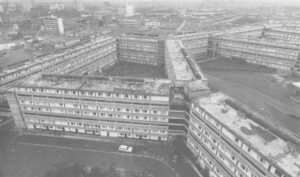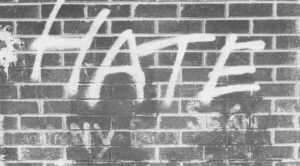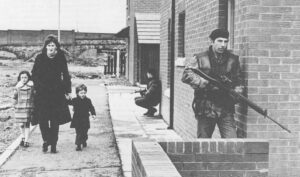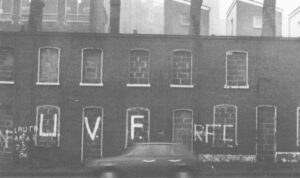BELFAST–Just on the edge of downtown Belfast is a public housing project, populated entirely by Catholics, called Divis Flats. Though the flats were built less than 15 years ago, the site is now a slum. Rats run on balconies late at night, and are hunted for sport by dogs and children. Soldiers long ago put out the lights in some passageways because they made the troops better targets, and people occasionally defecate in the dark stairwells. The residents are looked down upon, even by their own kind from up the road, as a lower form of humanity. They are also looked down upon by the army, which has an observation post on top of Divis Tower, 20 stories above the ground.
In the lower depths of one block of flats is a set of garages. One of the garages was converted to a youth club years ago. At one point the club was run by one Joe Morgan, and it came to be known as Crazy Joe’s. Joe is now long gone, but the name remains. At night, kids from the flats gather in the drafty, dank, illheated rooms to play snooker on warped tables and shoot the bull with the youth worker. By day, six girls age 12 to 16, gather in one of the rooms, so cold that they often keep their coats on, to attend their own little school. The school’s proper name is the Divis Education Center, but the kids all call it Crazy Joe’s.
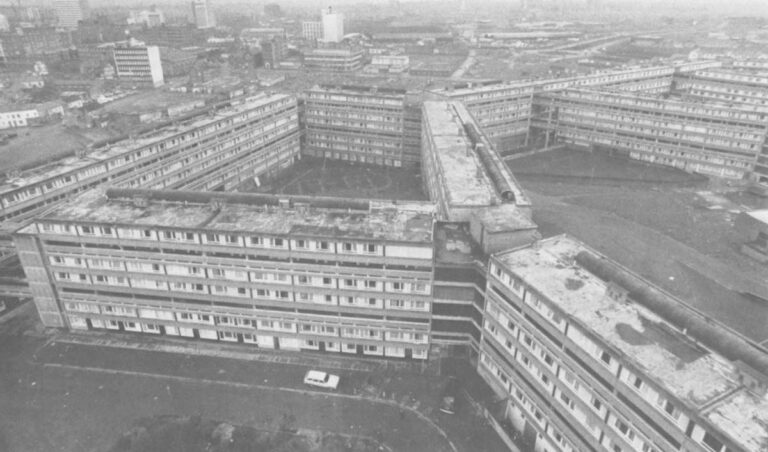
One day shortly before Christmas, Eleanor McClorey, the school’s teacher, began reading a story to the girls about a Polish family imprisoned in a concentration camp during World War II. She came upon the name Hitler. “Who knows who Hitler was?” she asked.
“He was the leader of the Nazis,” said Colette, one of the older students.
Bridget, 12 years old, asked for clarification. “Was he a Catholic or an Orangie?”
Ms. McClorey hardly flushed. She explained that Hitler was neither, that he was a German. Colette added that Hitler had hated Jews.
“What’s a Jew?” Bridget asked.
Ms. McClorey explained that Jews are people who come originally from Palestine, and that Jesus himself was a Jew.
“Then Hitler was an Orangie,” Bridget concluded, figuring that anyone who hated Jews also hated Jesus.
The students at Crazy Joe’s are not unintelligent, but their view of the world outside the flats is a little hazy because it has been stunted. Their formal schooling was terminated by the principal of St. Louise’s, the local Catholic girls secondary school, who told all six at various points during the past four years that they were no longer welcome. Their offenses included cutting classes, smoking in the washrooms, hopping on the back of lorries while in school uniform, and being disruptive in class. One of the girls was expelled after just three weeks of school and she spent the next four years getting no education at all. Bridget, kicked out for smoking and “mitching” (cutting classes) was pleased to leave. Colette was not so pleased, and she and her mother begged the principal for reinstatement, to no avail. (The names of the children and their famil ies have been changed for their own protection).
There is no doubt that the six were difficult kids, and on the face of it, their expulsion seems routine. The principal says she has done all she can for them, that now they are the state’s responsibility. Such things happen in Catholic communities all over the world. In Catholic West Belfast, however, to be expelled from school at age I I or 12 is to be doomed to illiteracy, for there is nowhere else to go.
It would seem logical that after being expelled from St. Louise’s, Colette or Bridget or any of their four schoolmates would go to either another Catholic school, or to a state school. The other Catholic schools, however, are afraid of becoming dumping grounds for St. Louise’s more difficult students, and so won’t have them. There have been one or two exceptions, but the general rule is that once you have been expelled from one Catholic school, you are not wanted in another.
And although Catholic children are allowed to attend state schools, they simply can’t. State schools are located in exclusively Protestant areas, and in effect, “state” is just a euphemism for “Protestant”. “If a Catholic parent sent his kid to our school, the kid would be murdered,” one education welfare officer said last spring. She went on to relate the story of a boy called Sean, a Catholic name, who was beaten on his first day at school by his classmates. The boys had just assumed that with a name like Sean, the kid must be a Catholic. In fact, the child was Protestant; his first name was Richard, but he preferred to be called by his middle name, Sean.
To anyone outside Northern Ireland, there would seem to be two obvious solutions: either the state should set up a school in Catholic territory, or it should force the Church to provide for children like Colette and Bridget, since the operation of the Church schools is funded by the state anyway. However, the state won’t act on either option: First, it would be a lot of bother, and these kids are easily written off. Second, the state is scared silly of the Catholic Church.
The Church’s power in West Belfast is enormous. Almost all major buildings are Church controlled, so if you are a member of a theatre group, and the parish priest doesn’t like your play or your politics, you could find, as a group did recently, that you have no access to a hall to stage your production. Since many social affairs in Catholic neighborhoods are run through the Church, at a Church hall, or with a priest or nun as a member of the committee, anyone who has fallen out of favor with the clergy could end up with a very limited social life.
One way that a few liberal, middle class Catholics have fallen out of favor is by sending their children to private schools. The parents who do this generally live in one of the few “mixed” areas of the city and generally believe that the only hope for Northern Ireland lies in integrated education. It is no easy path. Catholic children make up a very small proportion of the students in any private school. One integration advocate tells of coming home after a television interview to find his son in tears. In the program, the father had been identified as a Catholic who sent his children to Protestant schools, and the boy was scared to go to his classes the next day. He had been exposed as a Papist, his cover was blown, and he could no longer pass.
Priests have denounced the integrationists from the pulpit, and the bishop for a long time refused the children in non-Catholic schools the sacrament of Confirmation. Catholic professionals who fall in with the crowd run the risk of losing their clients. Catholic teachers risk losing their job.
The opening of a state school in West Belfast would be seen by the Church as an invasion of its turf. Even if the state opened just a small establishment, a school for kids like Bridget and Colette whom the Church has abandoned, the act might be seen as an indictment of the Church for its brutal sentencing of difficult children. Any government minister who chose to point out the problem would be seen to be critical of the Church, and would run the risk of appearing to be a bigot no different than those who misruled the province for decades.
Why should the state fear the Church? In a recent interview, Tony Spencer, a Catholic leader in the movement for integrated schools and a member of the school board, compared the relations between Church and state to a nonaggression pact between great powers. Just as the troubles were starting 12 years ago, the two bodies worked out an agreement whereby the Church, in exchange for greater government assistance from the state in running its schools, allowed for some taxpayer representation on the schools’ governing boards. “The Unionist [Protestant] politicians convinced themselves that they would then have some small input into the way Catholic schools were run,” Spencer said, “and in exchange for the increased financial assistance, the Catholic hierarchy could be relied on not to do any dangerous or damaging thing.”
“The Department of Education will never allow the Catholic monopoly [of education of Catholics] to be destroyed,” Spencer said. “The thought of Catholic bishops revoking the nonaggression pact and hurling spiritual bombs at them keeps the department in line. They know that the last people you must antagonize are the Catholic bishops. All it takes is something like the Cardinal to visit the Maze prison, or to comment on the treatment of suspects in police custody. He can comment on any issue in the exercise of his pastoral function, and he can present it to the world as pastoral concern. The political implications are explosive. If the bishops want to create mayhem, they can do more than the IRA can. They can make the province ungovernable.”
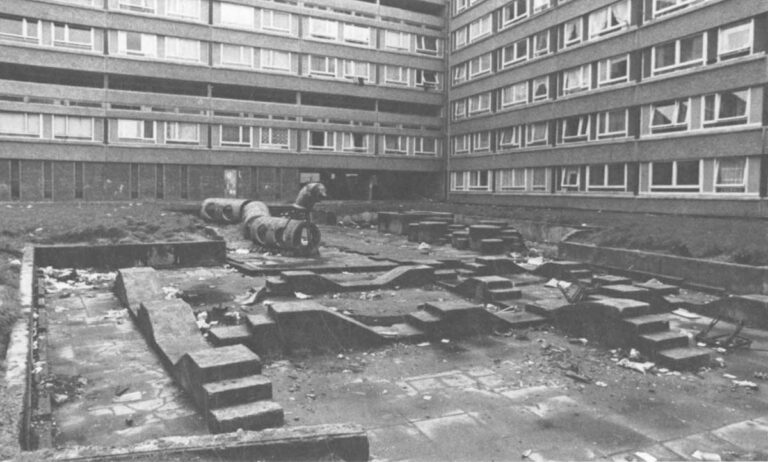
So the state will not provide for the likes of Colette and Bridget, and neither will the Church. The children, easily forgotten, just melt back into ghettoes like Divis Flats, Turf Lodge, or Ballymurphy. One member of Crazy Joe’s governing board estimates that in Divis Flats alone there are at least 30 girls who have been expelled or permanently suspended from school; however, no one knows for sure, as St. Louise’s and the other girls’ schools rarely notify the authorities when they exclude a child from school. Often there is no formal notice even for the girls’ parents.
There are no boys in Crazy Joe’s, though several have asked to be admitted. The problem lies in the fact that the Catholic boys’ secondary schools, unlike the girls’ schools, expel no one. The headmasters nobly believe that their doors should be open to all. Unfortunately, a great number of boys enrolled in the schools are consistently truant. If McClorey takes a truant into the Divis Education Center, she could be brought to court for keeping a child from attending school, because Crazy Joe’s is not recognized as an educational institution by the state authorities. So many of the boys of Divis Flats go nowhere. When law and order in West Belfast began to break down at the outset of the troubles, the established procedure for dealing with truants crumbled as well. In essence, the state has done little about truants in West Belfast in the last ten years.
The state and Church policies leave McClorey and her students in a curious position. The state will provide no funds, but since some members of the school board are sympathetic, the school is permitted to be held in a state funded youth club; if the board chose to, it could evict the school. However, the education authorities dare not press too hard, because they are required by law to provide for the education of every child, and they are clearly not fulfilling their legal obligation.
The Church authorities are not fond of Crazy Joe’s because they have no control over a school on their own turf, and because religious instruction is not part of the curriculum. However, the Catholic authorities dare not attack, as they have washed their hands of these girls and have chosen to ignore the morality of that washing. To have that pointed out in public would indeed be embarrassing.
And so Crazy Joe’s exists because the two giants pretend it isn’t there while each blames the other for its existence.
While the discussion of Adolf Hitler’s politics continued, Janet Kelly, a petite 13 year old, scribbled on the back of a cigarette package, writing “FTPISA” and “UTDHTJ” in several- patterns. She later explained that the first set of letters stood for “Eff the Provies, Irps, Stickies, Army.” “Eff” is a common expression in Belfast, as in “eff off”; the speaker means to say “fuck”, but doesn’t indulge in the profanity. The Provies are, of course, the Provisional IRA. Irps is the nickname given to the I.R.S.P., the Irish Revolutionary Socialist Party, a brand of Catholic revolutionary a bit further left than the IRA. The Stickies are the Official IRA. The Army is the army.
“UTDHTJ”, Janet explained, means “Up the Divis Hoods, Thieves, Joyriders.” There is a subculture in both Protestant and Catholic Belfast of disaffected, bored, unemployed youths, males age 12 to 20, called hoods. The Divis hoods are given to petty theft, usually burglary or shoplifting in city center shops. At night, the hoods steal cars, not as a money making venture, but just to relieve their boredom. A few have been shot dead in the act by the army. For some of these joyriders, the shootings are a deterrent; for others, they are an attraction.
Janet and her classmates, outcasts themselves, would naturally side with the young outlaws. The girls have known no other time but the troubles. They have seen the army raid homes at 5 am. Their brothers, uncles, and neighbors have been carted off at gunpoint. They could hardly see the police, an overwhelmingly Protestant force, as anything but the enemy, and for years the police have found the flats so hostile that they would not enter except in armored jeeps or with an army patrol as backup.
It is not surprising that the girls have no liking for the forces of law and order. However, they also have little sympathy for the Catholic paramilitary groups. The girls are well aware that the IRA robs banks, post offices and shops, and that hijacked cars are used to make getaways. Yet now, in the absence of the police force in Catholic areas, the IRA tries to play the role of guardian of the public order, sporadically punishing hoods, young and old, for petty crimes and auto theft. Those caught are beaten bloody or shot through the knee. The girls see the IRA’s moral code as absurd, and so perceive the Provisionals not as the protectors of the Catholic community, but as the people who punish the hoods. And so Janet Kelly is given to writing “UTH” (“Up the Hoods”) on her class papers, her desk, her matchbooks.
While Janet scribbled her slogans, the other girls talked of World War 11. One student knew that Hitler had committed suicide, and Bridget, upon hearing this, concluded that he could not have gone to heaven.
“There’s more to it than that,” Colette said. She seemed to suspect that people who killed themselves might not be so quickly condemned. Adolf Hitler was forgotten for the moment, and the discussion turned to suicide. There have been several suicides in the flats in the past few years, and the class had recently been to see a play where one of the main characters claimed he had been very depressed and had gone to Divis Towers, prepared to throw himself off. However, he said, the queue was a bit too long, so he just went home.
All of the girls were acquainted with a recent case involving a mother and child, and they related it to Ms. McClorey. The woman had told her 8 year old to run up to her uncle’s flat, saying that she would follow but first had to go make a phone call. The mother went instead to the top of Divis Tower and jumped off.
“Well, I’d never let my mother go off like that,” Bridget said. “If she said, ‘I’m going to make a phone call,’ I’d say, ‘I’ll go with you.’'”
The mothers of the six girls in Crazy Joe’s are a longsuffering lot. Together they have borne over 40 children. All of the social diseases of the flats have been visited upon their families: wifebeating, child abuse, alcoholism, unemployment, paramilitary involvement, imprisonment, beatings by the security forces, beatings by the IRA or some other group of vigilantes, kneecappings, shootings. Four of the mothers have no husbands-the men have died or they have moved away. Their sons are up for petty theft, and in some cases, so are their daughters. The families face enormous debt for electricity, gas, coal, and rent-some to the tune of $4,000 to $6,000-and the government makes deductions from their welfare checks accordingly.
Yet in spite of all the misery and deprivation, the girls and their mothers seem to like the flats. According to Ms. McClorey, the girls’ main ambition is to get married and live in Divis.
All of the girls are doing better in the subterranean atmosphere, with books and desks scrounged from here and there, than they did in St. Louise’s, a school with modern facilities, proper heat and lighting, and a large and varied faculty, where the code of conduct demands skirts to be worn at a certain length, blouses to be clean, and socks and sweaters to be a certain color and style. Eleanor McClorey, the girls’ teacher deserves much of the credit. McClorey, a devout Catholic and an attractive young woman with long dark hair, received her education degree last year and joined the swollen ranks of unemployed teachers, a bit disillusioned and without much interest in teaching in a normal secondary school. By accident she was introduced to the group of social workers in the flats who were trying to set up a school for the kids who were running around without one. The Divis Education Center opened in September, and the girls that the staff of St. Louise’s could not deal with became the charges of Eleanor McClorey, rookie.
There were, of course, no funds, as neither the state nor the church were going to back the program. So McClorey worked without pay for the first semester, living on her unemployment compensation, which, after she paid her rent, left her with15 pounds per week to live on. The school has received a 2,000 pound grant from a private foundation for 1981, and so McClorey is now being paid a small salary.
The kids are beautiful, spunky, tough. Any teacher who was not flexible and blessed with considerable tolerance would find it hard going. One day in late November, McClorey sent two of the girls to a nearby shop for chocolate biscuits for the group’s tea break, giving them the money and lending them her coat. They brought her change back in full, but intimated that there might be more in her pocket than the coins. Anyone who knows the flats would suspect a dead rat had been inserted as a surprise. There was much giggling, shared by the brave McClorey, and there was no rat-the kids were only fooling.
The curriculum includes history, math, grammar, and literature. On Monday afternoons, the students go to a nearby kitchen and learn how to cook, and on Wednesdays a folksinger of considerable talent, a friend of McClorey’s comes in to teach music.
Occasionally, McClorey has her students write stories in class. One of the older girls, who had been out of school for three years until Crazy Joe’s started, read the fairy tale “The Twelve Dancing Princesses” in one of the books donated to the school, and penned her own version. The original story goes like this: Once upon a time, a King was worried about his 12 daughters. Every night they went to bed with new slippers, and every morning the slippers were worn out. The expense didn’t bother the king because he was very wealthy, but he wanted to know how it happened. Many nobles came forward to help solve the riddle, but none succeeded. Finally, a common soldier volunteered his services. He was tipped off by a beggar-that he should not drink the wine the girls offered at bedtime, and as a result, he discovered that the girls danced all night at a magic castle. The king allowed him to marry one of the princeses as a reward. Eventually, the soldier inherited the kingdom, and everyone lived happily ever after. The Crazy Joe’s version goes like this: Once upon a time, there was a poor king. He had 12 daughters who were very good dancers, and every day he took them down to Castle Street (a street in Belfast where fruit and vegetables are hawked at curbside), where they danced to raise money. Many people threw them coins, but the girls remained hungry and poor. They could not understand where the money went. One day, one of the princesses followed her father and discovered that he spent it all in the bookie’s and the pub. So the princesses decided to withhold some of the daily proceeds. The poor king, however, discovered their plot. And so he killed them.
©1981 John Conroy
John Conroy is spending his fellowship year reporting on the “Social and Economic Consequences of the War in Northern Ireland.”

